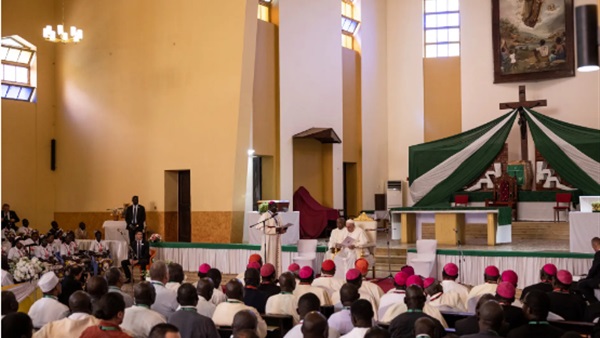Pope Francis Urges Leaders to Seek Peace in South Sudan

Pope Francis ended his African tour with a visit to South
Sudan, where he met with displaced people and called on leaders to take action
towards peace. At Freedom Hall in Juba, the capital, Pope Francis expressed his
solidarity with the displaced South Sudanese and referred to their situation as
the "greatest enduring refugee crisis on the continent" caused by
war, ethnic strife, violence, and natural disasters.
Pope Francis' visit was an attempt to use his moral capital
and international reputation to push for peace in the war-torn country, which
is the world's newest and largely Christian nation. However, it is unclear what
kind of country the displaced people can hope to return to, as the country is
still plagued by conflict and corruption. The country's wealth of natural
resources, including Africa's third largest oil reserves, continues to attract
plundering and corruption.
Cardinal Luis Antonio Tagle of the Philippines expressed
hope that Pope Francis' visit would bring attention to the suffering of the
South Sudanese people and the international community would come together to
support peace. The Bank of South Sudan's governor, Johnny Ohisa Damian,
expressed hope that Pope Francis' push for peace would attract international
financial investment and encourage the United States and other Western donors
to shift their relief aid to development.
However, the country cannot rely on oil alone, as its
reserves are expected to be exhausted in the next 11 years. The government
needs to diversify its economy by utilizing its fertile land for large-scale
farming and livestock production. Pope Francis echoed this point, envisioning
agriculture and livestock jobs for the displaced people.
Nearly eight million South Sudanese, or two-thirds of the
population, are projected to suffer from acute food insecurity by April, with
1.4 million children expected to become malnourished. The United States, as the
largest donor to South Sudan, spends about $1 billion a year on aid but is
becoming frustrated with the failures of the country's leadership. The
country's post-independence leadership has made it a "toxic" subject
in Washington, with experts arguing that the Americans are partly responsible
as they argued the country's viability was due to its oil.
In conclusion, Pope Francis' visit to South Sudan highlights
the ongoing struggles faced by the country and its people, including conflict,
corruption, and food insecurity. The international community must come together
to support peace and stability in the country, which can only be achieved
through a combination of investment, diversification of the economy, and responsible
leadership.







